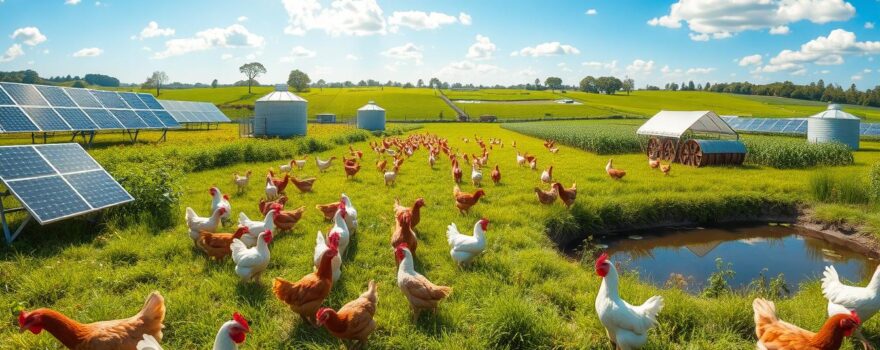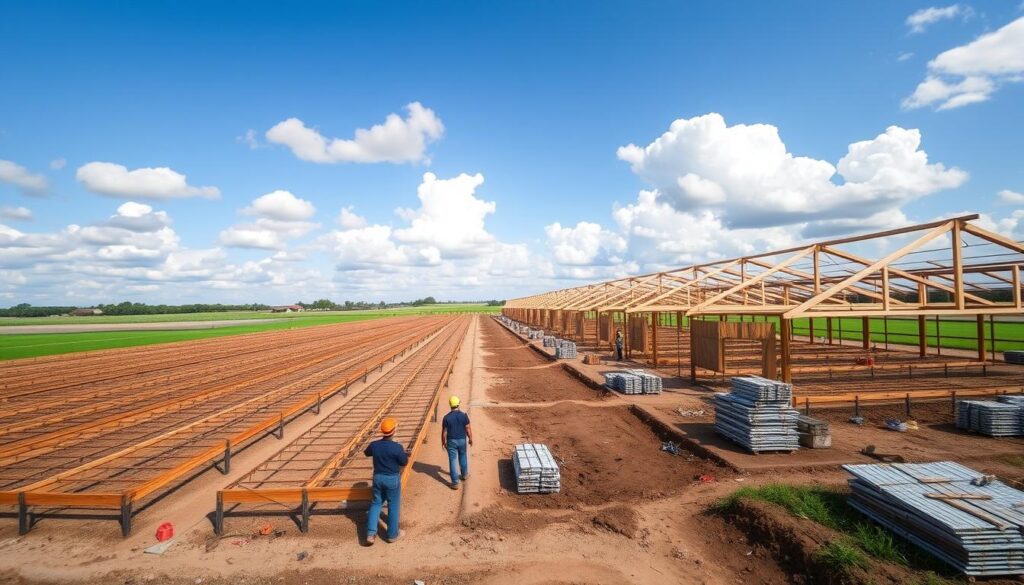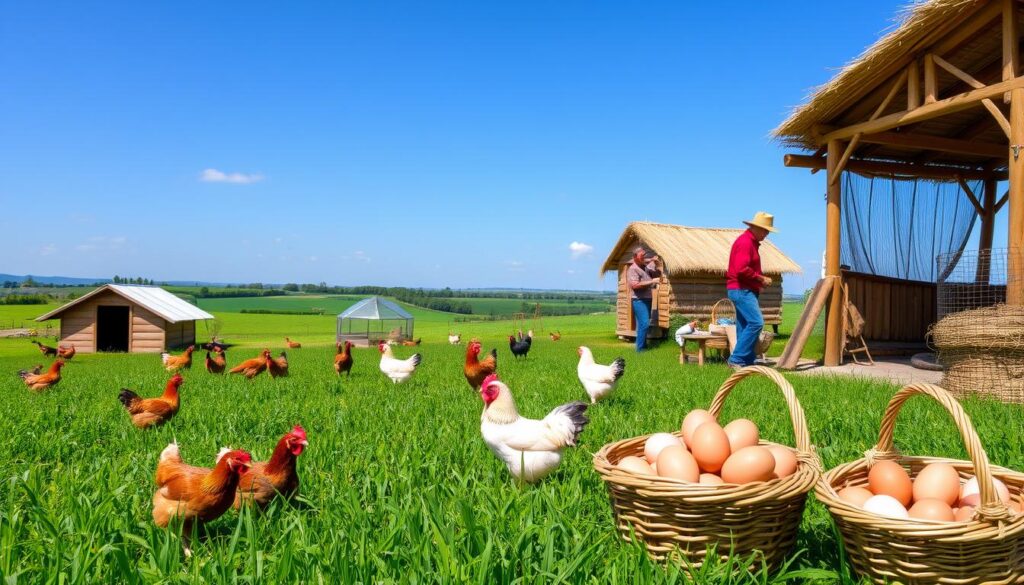
Creating a sustainable broiler chicken farming business plan is key for long-term success. It ensures your farm is profitable and good for the environment. This guide will help you make a detailed plan that covers important areas like managing flocks, designing facilities, making financial forecasts, and marketing strategies.
By using sustainable methods in your plan, you can boost your farm’s productivity and reduce its environmental footprint. This approach also helps meet the increasing need for poultry products that are raised responsibly.
Key Takeaways
- Comprehensive business plan critical for long-term success in broiler chicken farming
- Incorporating sustainable practices can enhance profitability and environmental impact
- Flock management, facility design, financial projections, and marketing strategies are key components
- Thorough research on industry trends and challenges is crucial for a successful business plan
- Seeking professional guidance can improve accuracy and reliability of financial projections
Introduction to Broiler Chicken Farming
Broiler chicken farming is a very profitable business. It’s great because chickens grow fast and people want to buy their meat. Poultry, like chickens and turkeys, are important for food and farming worldwide.
Why Start a Broiler Chicken Farming Business?
Starting a broiler chicken farm has many benefits:
- Fast Reproduction and Large Numbers – Healthy chickens can lay lots of eggs, helping the farm grow fast.
- Fast Growth Rate – Chickens are ready to sell in just 27-28 weeks, making money quickly.
- Profitable Pricing – A healthy chicken can sell for $10-$11, making good profits.
Raising poultry in a green way can help the planet. Farms of all sizes around the world raise chickens and other birds.
“Broiler chicken farming is a highly lucrative and rewarding business opportunity, offering fast reproduction, rapid growth, and strong market demand.”
The food chickens eat is key to farming’s future. Farmers use grains and pulses like corn and soybeans. Chickens are often raised on the floor, with litter to catch their waste.
Planning Your Broiler Chicken Farming Business
Starting a broiler chicken farm needs careful planning and smart decisions. You must pick the right chicken breeds, housing, and focus area in the poultry industry.
Selecting the Type of Broiler Chickens
First, decide which chickens to raise. Do you want to produce eggs or meat? Layer chickens are best for eggs, while broilers are for meat. Look into different broiler chicken breeds to match your goals and what customers want.
Choosing the Right Housing and Cage Type
Next, pick the right poultry housing and cage system. This choice depends on your farm size, chicken breed, and if you want to farm sustainably. Think about chicken coops, free-range systems, or chicken tractors for your birds’ health.
Determining Your Area of Focus
Lastly, decide where you want to focus in the poultry industry. You might specialize in layer chickens, broilers, hatcheries, or poultry feed manufacturing. Focusing helps you run your farm better and make more money.
By planning these key parts of your broiler chicken farm, you’re setting up for success and sustainability.
| Broiler Chicken Breed | Key Characteristics | Recommended Housing |
|---|---|---|
| Cornish Cross | Rapid growth, efficient feed conversion, high meat yield | Conventional chicken coops, pasture-based systems |
| Orpington | Dual-purpose (meat and eggs), docile temperament, good foragers | Free-range, pasture-raised systems |
| Australorp | Excellent egg production, calm disposition, hardy and adaptable | Confined housing, free-range systems |
“Sustainable practices reduce reliance on cash flow and outside suppliers, ultimately increasing profitability.”
How to Develop a Sustainable Broiler Chicken Farming Business Plan
Creating a sustainable broiler chicken farming business plan is key for long-term success. It ensures your farm is profitable and good for the environment. By focusing on important elements, you can make a detailed plan. This plan will help you make money and protect the environment.
Start by setting clear goals, identifying your target market, and planning your marketing. Knowing your goals and market helps you find the best opportunities. It also makes sure your products meet customer needs.
Choosing the right location for your farm is next. Look at accessibility, land costs, and environmental rules. This ensures your farm can grow while being kind to the environment.
Getting the right funding is also crucial. You might use personal savings, investors, or loans. Understanding your financial needs and how to get the money is essential for your farm’s growth.
Your plan should also include sustainable practices. These can lower your farm’s environmental impact. Consider free-range housing, efficient waste management, and using renewable resources.
| Sustainable Practices for Broiler Chicken Farming | Benefits |
|---|---|
| Free-range or pasture-raised housing | Improved animal welfare, reduced environmental impact, and potential for organic certification |
| Efficient waste management | Reduced greenhouse gas emissions, potential for fertilizer production, and water conservation |
| Utilization of renewable resources | Reduced reliance on non-renewable energy sources, improved resource efficiency, and enhanced sustainability |
By adding these sustainable practices to your plan, you boost your farm’s profit. You also help the environment and ensure long-term sustainability.
“Sustainable farming practices are not just good for the environment, but they can also improve the bottom line for broiler chicken farmers.”
Selecting the Ideal Location
Finding the right poultry farm location is key for your broiler chicken farm’s success. You need to think about how close it is to your market, the infrastructure available, land costs, and environmental regulations.
Your farm should be in a rural area with good road access, plenty of water, and few environmental issues. It must also follow local laws and not harm the community’s health or safety.
Factors to Consider for Poultry Farm Location
- Proximity to Target Market: Pick a spot close to your customers. This cuts down on transport costs and ensures quick delivery of chickens.
- Infrastructure Availability: Make sure the site selection has the basics like good roads, reliable power, and water. This makes your farm run smoothly.
- Environmental Regulations: Check and follow all environmental regulations for poultry farms in your area. This includes managing waste, air quality, and distance from homes.
- Land Costs and Availability: Look at the land prices and availability. Choose a spot that’s affordable and can grow with your farm.
By thinking about these points, you can find the best spot for your broiler chicken farm. This ensures it’s sustainable and successful in the long run.
| Key Sustainability Metrics | Improvement since 1965 |
|---|---|
| Greenhouse Gas Emissions | 36% Decrease |
| Land Usage | 72% Decrease |
| Water Consumption | 58% Decrease |
| Feed Conversion Efficiency | 24% Improvement |
| Poultry Litter Recycling | Over 95% in 2010 |
The data shows the poultry industry has made big steps to reduce its environmental impact. It shows how important it is to farm sustainably.
“Proper planning in siting new poultry facilities is crucial to prevent environmental issues, save time, money, and avoid potential headaches down the line.”
Financing Your Broiler Chicken Farming Business
Starting a broiler chicken farm needs a lot of money upfront. You’ll need land, housing, equipment, and chicks. Finding the right funding is key to making your dream come true.
Getting loans from banks can be tough. Banks see poultry farming as risky due to price changes, diseases, and cash flow issues. But, a good business plan and financial forecast can help.
Using your own savings or assets as collateral is a simple way to fund your farm. You could also look into government grants or subsidies for agriculture and poultry.
Investors and crowdfunding sites might be interested in poultry farms with growth potential. This way, you can reach more people looking to invest.
“Securing the right financing is the foundation for a thriving broiler chicken farming business. With a comprehensive business plan and a diverse range of funding options, you can turn your poultry farming dreams into a sustainable reality.”
When looking for poultry farming financing, don’t limit yourself. Explore everything from bank loans to new funding options. A well-thought-out plan will help you start a profitable chicken farm.
Setting Up the Broiler Chicken Farm
After getting the money and picking the right spot, it’s time to set up your poultry farm. You need to build the right housing and facilities for your birds. Make sure the broiler chicken housing is designed with the birds’ health in mind. It should have good ventilation, temperature control, and enough room to move.
Constructing the Broiler Chicken Housing
Building the broiler chicken housing is key to setting up your poultry farming infrastructure. You should think about:
- Enough space for the broilers to move and grow
- Good ventilation to keep air quality and temperature right
- Systems for managing waste to keep the place clean and healthy
- Durable, easy-to-clean materials for the structure
Purchasing Necessary Equipment and Supplies
You’ll also need to buy important farm equipment and supplies. This ensures your poultry farm runs well and sustainably. You might need:
- Feeding systems for a balanced diet
- Water drinkers for clean, fresh water
- Lighting to control the day-night cycle
- Equipment for managing waste and litter
By planning and building the broiler chicken housing and getting the right farm equipment, you can make a successful poultry farm. It will focus on the health of your birds and the success of your business.

“Successful poultry farming is not just about raising chickens; it’s about creating a well-designed, efficient, and sustainable operation that meets the needs of both the birds and the business.”
Managing the Broiler Chickens
Managing your broiler chickens well is key to a successful poultry farm. Start by choosing high-quality day-old chicks from a trusted hatchery. This ensures your flock is healthy and strong. It’s also important to give them a balanced diet that meets their needs at each growth stage.
Selecting High-Quality Day-Old Chicks
When picking chicks, look for a hatchery that follows strict biosecurity and has NPIP certification. These chicks are healthier and less likely to get sick. Also, think about the chicks’ genetic makeup. Some breeds might be better for your farm goals and market.
Providing Proper Nutrition and Feed
Choose a high-quality feed that matches your broilers’ nutritional needs at each stage. Work with a poultry expert or feed supplier to create a feeding plan. This plan should help your birds grow fast and stay healthy. Keep an eye on how much they eat and drink to spot any problems early.
| Nutrient | Broiler Starter (0-3 weeks) | Broiler Grower (4-6 weeks) | Broiler Finisher (7+ weeks) |
|---|---|---|---|
| Crude Protein | 23-24% | 20-22% | 18-20% |
| Metabolizable Energy | 3,000-3,100 kcal/kg | 3,100-3,200 kcal/kg | 3,200-3,300 kcal/kg |
| Calcium | 1.0-1.1% | 0.9-1.0% | 0.8-0.9% |
| Available Phosphorus | 0.45-0.50% | 0.40-0.45% | 0.35-0.40% |
By focusing on the right chick selection and nutrition, you can improve your flock’s performance. This sets the stage for a thriving and sustainable broiler chicken farm.
Marketing and Sales Strategies
Creating effective marketing and sales plans is vital for your broiler chicken farm’s success. First, identify your target market. This could be homes, restaurants, supermarkets, or big buyers. A focused marketing plan is key to selling more and building your brand.
Identifying Your Target Market
Understanding your target market is crucial for broiler chicken marketing. Look at location, income, diet, and buying habits. For example, city folks might buy differently than those in the countryside. Segmenting your market helps you tailor your marketing to reach your best customers.
Developing a Pricing Strategy
Setting the right price for your chickens involves looking at costs, demand, and what others charge. You want to make money but also be affordable for your customers. Costs like feed, housing, and labor affect your prices. Also, think about offering discounts for big orders to attract bigger buyers.
Using different sales channels like direct sales, wholesale, or local partnerships can help you sell more. Good marketing and branding make your chickens stand out. This appeals to health-focused buyers who are willing to pay more for quality.

| Key Strategies | Benefits |
|---|---|
| Target Market Identification | Enables personalized marketing and sales approaches to reach the right customers |
| Pricing Strategy Development | Balances profitability and affordability to attract a wider customer base |
| Diversified Sales Channels | Expands reach and revenue potential by tapping into various distribution networks |
| Effective Branding and Marketing | Helps differentiate your sustainably-raised broiler chickens in the market |
Sustainable Practices for Broiler Chicken Farming
Sustainability is key in modern broiler chicken farming. Eco-friendly practices reduce environmental impact and meet consumer demand for responsibly sourced poultry. Raising broilers in free-range or pasture-raised methods is a sustainable approach.
Free-Range and Pasture-Raised Poultry
Free-range and pasture-raised broilers get to roam and forage naturally. This improves their welfare and makes their meat healthier and tastier. Organic chicken is rich in nutrients like omega-3 fatty acids and vitamins, appealing to health-conscious buyers.
Waste Management and Resource Utilization
Effective waste management is vital in sustainable broiler chicken farming. Composting chicken litter and using it as fertilizer is a key strategy. It reduces waste and supports the circular economy, where waste is turned into valuable resources.
Sustainable poultry farming helps achieve goals like Zero Hunger (SDG 2) and Responsible Consumption and Production (SDG 12). By adopting eco-friendly practices, farmers can feed the world sustainably.
“Sustainable broiler chicken farming is not just an environmental imperative, but also a strategic business decision that allows farmers to meet the evolving needs of conscious consumers and contribute to a more sustainable future.”
Creating a detailed and sustainable broiler chicken farming business plan is key. It helps you start a profitable and eco-friendly poultry business. Think about flock management, facility design, financial plans, and marketing strategies. This way, you can make a plan for success in sustainable broiler chicken farming.
Adding sustainable practices like free-range housing and waste management boosts your business. It also meets the need for ethically made poultry products. A good business plan lets you use the US poultry industry’s strengths. This helps you reach your goals of profitability and environmental stewardship.
Keep up with industry trends and use new technologies. Focus on sustainable practices too. This way, your broiler chicken farming business can thrive in the US market. With smart planning, efficiency, and care for the environment, you can reach your goals in this growing sector.